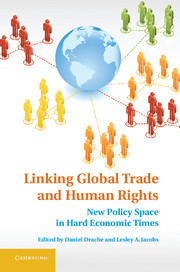Description
Linking Global Trade and Human Rights
Coordinators: Drache Daniel, Jacobs Lesley A.
This book introduces the idea of policy space as an innovative way to reframe recent developments in global governance.
Language: English
Linking Global Trade and Human Rights
Publication date: 03-2014
Support: Print on demand
Publication date: 03-2014
Support: Print on demand
Linking Global Trade and Human Rights
Publication date: 07-2015
Support: Print on demand
Publication date: 07-2015
Support: Print on demand
Description
/li>Contents
/li>Biography
/li>
During the global economic crisis of 2008, countries around the world used national policy spaces to respond to the crisis in ways that shed new light on the possibilities for linkages between international trade and human rights. This book introduces the idea of policy space as an innovative way to reframe recent developments in global governance. It brings together a wide-ranging group of leading experts in international law, trade, human rights, political economy, international relations, and public policy who have been asked to reflect on this important development in globalization. Their multidisciplinary contributions provide explanations for the changing global landscape for national policy space, clearly illustrate instances of this change, and project the future paths for policy development in social and economic policy spaces, especially with reference to linkages between international trade and human rights in countries from the Global North as well as Brazil, China, and India.
Part I. Trade Governance and Human Rights: 1. Humanizing global economic governance Sol Picciotto; 2. The promise of linking human rights and trade Ernest-Ulrich Petersmann; 3. Free trade agreements and global policy space after the great recession Jorge Heine and Joseph Turcotte; Part II. Global Protest and Innovation from Below: 4. From Seattle to occupy: the shifting focus of social protest Tomer Broude; 5. What's next for global labour? Power dynamics and industrial relations systems in a hyperglobalized world Daniel Drache; 6. Global tobacco control and trade liberalization: new policy spaces? Lesley Jacobs; Part III. Paradigm Shifts and Structural Change: 7. Business, policy spaces, and governance in India Kuldeep Mathur; 8. India's pharmaceutical industry: policy space that fosters technological capability Amit Ray and Saradindu Bhaduri; Part IV. Contested Policy Spaces in Social Welfare: 9. Reducing poverty in Brazil: finding policy space for meeting developmental needs Kathryn Hochstetler; 10. The global health policy agenda and shrinking policy spaces in the post crisis landscape Ron Labonté; 11. The World Trade Organization and food security after the global food crises Matias Margulis; Part V. Innovations in International Human Rights: 12. Decent work for domestic workers as a new policy space Adelle Blackett; 13. Is there policy space for human rights linkages in China's trade and investment strategy? Ljiljana Biuković; Part VI. China`s Evolving State Policy and Practices: 14. Human rights and social justice in China Pitman Potter; 15. New policy space for collective bargaining in China Sarah Biddulph; 16. Industrial relations in post-transition China: the challenges of inequality and social conflict Chang-Hee Lee.
Daniel Drache is Professor Emeritus of Political Science and Senior Research Scholar at the Robarts Centre for Canadian Studies, York University. He has been a research associate at the European University Institute, Florence; a professor invité at CEPREMAP-CNRS, Paris; a visiting scholar at Macquarie University, the University of Western Sydney, and the Australian Graduate School of Management at the University of New South Wales; a guest lecturer at Universidad Nacional Autónoma de México; and a Ford Foundation visiting professor at JNU New Delhi. His books include Defiant Publics: The Unprecedented Reach of the Global Citizen (2008); The Continental Illusion: Borders and the Search for North America (2006); Borders Matter: Homeland Security and the Search for North America (2004); and The Market or the Public Domain: Global Governance and the Asymmetry of Power (2001).
Lesley A. Jacobs is Professor of Law and Society and Political Science as well as Director of the Institute for Social Research at York University and Executive Director of the Canadian Forum on Civil Justice. He has held a range of visiting positions, including ones at Harvard Law School, Oxford University, Emory University, and the University of British Columbia. He is the author of numerous books, including Privacy Rights in the Global Digital Economy (2013), Balancing Competing Human Rights in a Diverse Society (2012), Pursuing Equal Opportunities (2004), The Democratic Vision of Politics (1997), and Rights and Deprivation (1993).
Lesley A. Jacobs is Professor of Law and Society and Political Science as well as Director of the Institute for Social Research at York University and Executive Director of the Canadian Forum on Civil Justice. He has held a range of visiting positions, including ones at Harvard Law School, Oxford University, Emory University, and the University of British Columbia. He is the author of numerous books, including Privacy Rights in the Global Digital Economy (2013), Balancing Competing Human Rights in a Diverse Society (2012), Pursuing Equal Opportunities (2004), The Democratic Vision of Politics (1997), and Rights and Deprivation (1993).
© 2024 LAVOISIER S.A.S.




